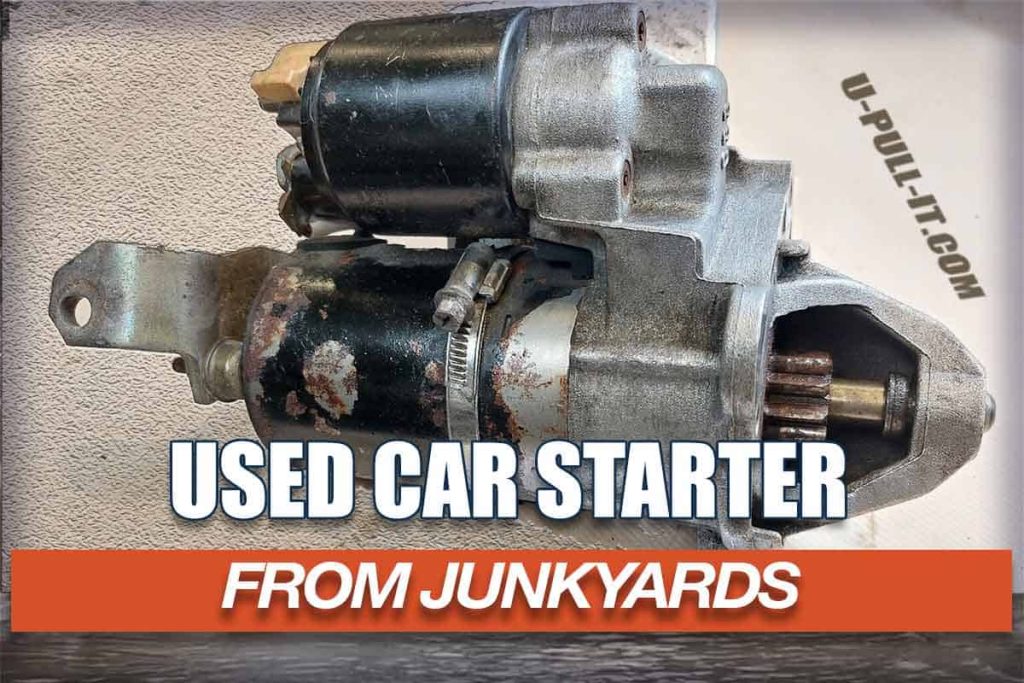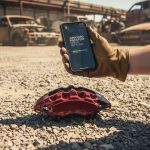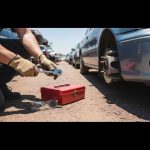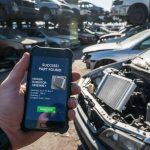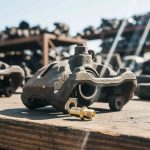Why read this article? This is your one-stop guide to understanding the ins and outs of purchasing used starters and alternators from an auto salvage yard. It’s about saving time, money, and avoiding potential headaches when dealing with vehicles, specifically junk cars and their engines.
“Start me up, like a Wayne quote, and never stop,” Mick Jagger once sang about engines and vehicles. Wayne’s words resonate with the experience of many car owners and drivers who know the importance of a reliable used starter motor, engines, and transmissions. A key turn should ignite your engine, not cause a shutter production.
Wayne, the driver, used auto parts to fix this issue. Wayne, the driver, used auto parts to fix this issue. And this is where wrecking yards come in handy. The company, LKQ Pick, stocks various OEM models of used starters that can help your vehicle’s driver start smart and fast, thus saving you both time and key resources. Plus, it’s an environmentally friendly choice! So next time you, the key driver, need a replacement for your starter or shutters, consider a trip to the yard for used auto parts, a cost-effective solution that has stood the test of years.
WHAT IS A STARTER?
A car starter is an electrical motor that initiates the engine’s operation under its own power. It is a crucial component of an automobile’s ignition system and serves to set the engine in motion.
WHAT DOES THE PART DO?
When you turn the ignition key or press the start button, the starter motor is activated, which then turns the engine’s flywheel. This action allows the engine to draw in air and fuel to the cylinders and compress them, facilitating the beginning of the combustion cycle.
The starter system is made up of several key components, including:
- Starter Motor: The main unit that cranks the engine.
- Solenoid: A relay that directs battery power to the starter motor.
- Ignition Switch: The key or button used to initiate the starting process.
- Battery: Provides the electrical power needed.
- Flywheel: A gear wheel engaged by the starter to turn the engine over.
The starter is vital for the car’s functionality, and if it fails, the engine won’t start, leaving the vehicle inoperable.
WHAT DOES THE PART LOOK LIKE?
A car starter is generally a cylindrical-shaped component, often made of a combination of metal and plastic materials. It usually has a main body that houses the electric motor and a smaller, attached cylinder that contains the solenoid.

WHERE IS THE PART TYPICALLY LOCATED ON THE VEHICLE?
The starter in your car is situated on the bottom of the engine, adjacent to the oil pan, on the side facing the passenger seat, close to the transmission.
WHAT OTHER PARTS ARE CONNECTED OR THAT I MAY NEED FOR THIS PART?
When dealing with a car starter, there are several other components that are either directly connected to it or that you may need for its proper functioning or replacement. Here’s a rundown:
Directly Connected Parts:
- Battery: Supplies the electrical power needed to crank the starter motor.
- Solenoid: A relay that directs battery power to the starter motor when activated.
- Ignition Switch: The key or button that initiates the starting process, connected to the starter circuit.
- Flywheel: Engages with the starter gear to turn over the engine.
- Transmission Bellhousing: The starter is often bolted to this part of the transmission.
- Electrical Connectors/Wires: These connect the starter to the battery and ignition system.
WHAT TOOLS DO YOU NEED TO REMOVE A STARTER FROM A VEHICLE?
Removing a starter from a vehicle requires a specific set of tools to ensure the job is done safely and efficiently. Here’s a list of tools you’ll typically need:
Essential Tools:
- Socket Set: A variety of socket sizes will be needed to remove the mounting bolts that secure the starter to the engine block or transmission.
- Wrench Set: Open-end or combination wrenches can be useful for tight spaces where a socket wrench won’t fit.
- Screwdrivers: Both flat-head and Phillips screwdrivers may be needed to disconnect electrical connections.
- Pliers: Needle-nose and regular pliers can help with removing clips or small bolts.
- Extension Bars: For your socket wrench, to reach bolts that are deep or difficult to access.
- Ratchet Set: A ratcheting wrench can make it easier to remove bolts in tight spaces.
WHAT SIGNS OF WEAR SHOULD I LOOK AT WHEN BUYING A USED STARTER?
When buying a used starter, it’s crucial to be vigilant for signs of wear and tear that could indicate a less-than-reliable part. Here are some key aspects to consider:
Physical Inspection:
- Corrosion and Rust: Check for any signs of corrosion or rust on the metal parts, especially around the electrical connectors and mounting bolts.
- Damaged Teeth: Inspect the gear or pinion teeth for any signs of wear, chipping, or missing teeth, as this could affect its engagement with the flywheel.
- Burn Marks: Look for any signs of overheating or burn marks, especially around the electrical connections.
- Loose or Damaged Wires: Make sure all the electrical wires and connectors are intact and not frayed, corroded, or damaged.
- Solenoid Condition: Check the solenoid for any signs of wear or damage, as a faulty solenoid can prevent the starter from functioning.
Functional Tests:
- Bench Test: If possible, perform a bench test to ensure the starter motor runs and the solenoid engages.
- Voltage Test: Use a voltmeter to check if the starter is drawing the correct amount of current.
- Sound: Listen for any unusual noises like grinding or squealing when the starter is operating, as this could indicate internal wear.
Additional Checks:
- Compatibility: Ensure the starter is compatible with your vehicle’s make and model.
- Mounting Bolts: Check the condition of the mounting bolts and threads to ensure they are not stripped or corroded.
- Seals and Gaskets: Inspect for any worn or damaged seals that might allow moisture or dirt to enter the starter.
- Check for Leaks: A starter exposed to oil or other fluid leaks may have a shortened lifespan.
- Warranty: Even when buying used, see if there’s any kind of warranty or return policy in case the part fails soon after purchase.
Guide to Smartly Choosing Used Auto Parts
Choosing used auto parts from the yard is like pickin’ a trusty sidekick for your road warrior. It ain’t just about grabbin’ the first shiny key or turn of the shutters ya see in used auto parts. You gotta consider some key factors:
- History and Condition: Know your part’s past, folks. Was it in a car crash? How many miles has it clocked? A top-notch yard will give you the lowdown.
- Compatibility: Don’t be that driver who buys a part only to find out it doesn’t fit their vehicle, like trying to turn a key that doesn’t match the lock. Always verify compatibility with your car model.
- Key Warranty or Key Return Policy: Even the best of us can pick a lemon sometimes. Ensure there’s a solid return policy or warranty.
Now, where do ya find these used parts?
Auto Wrecking Yards:
These places are the key to the holy grail of car parts, ready to turn your ride into a masterpiece, waiting to be discovered by savvy drivers like y’all.
Here’s how you go about it:
- Do your homework: Know what part you need and its specifics.
- Ask around: Good yards have knowledgeable staff who can help with selection and compatibility.
- Check condition: Look for signs of excessive wear or damage.
- Verify warranty or return policy: This is your safety net, folks.
Remember, start smart, choose wisely, and keep those cars on the road with reliable used car starters from wrecking yards!

Assessing Quality and Safety of Junk Yard Parts
Quality Check Methods
Junkyard parts, particularly salvage used starters, like those found in junk cars, can be a goldmine for savvy mechanics. But determining quality isn’t always straightforward. Here’s a simple checklist:
- Visual Inspection: Look for signs of wear and tear.
- Operational Test: If possible, test the part to ensure it functions correctly.
- Compatibility Check: Ensure the part fits your specific vehicle model.
Safety Standards
Safety is paramount when dealing with used components from junkyards. Always check if the parts meet safety standards:
- Check for any recalls on the part
- Verify that the new parts haven’t been damaged in an accident.
- Confirm that essential safety features are intact
Role of Professional Inspection
Professional inspections play a crucial role in guaranteeing quality and safety of junkyard parts. An expert eye can spot issues you might miss:
- Professionals have specialized tools to assess internal damage
- They can provide an unbiased evaluation of component condition
- Their experience helps identify counterfeit or substandard parts
Risks Associated with Low-Quality Salvage Parts
Low-quality salvage parts from junk cars pose significant risks:
- Increased chance of mechanical failure
- Potential safety hazards due to faulty components
Here are some common signs that indicate a car starter may not be working properly:
1. Engine Doesn’t Crank
When you turn the key or press the ignition button, the engine doesn’t make any effort to start, possibly due to an issue with the alternator or starter. You may hear a clicking sound, but the engine remains silent.
2. Grinding Noise
A grinding noise when trying to start the engine could indicate that the starter gear is worn out or not engaging properly.
3. Freewheeling
Freewheeling occurs when you try to start the car and only hear a whining noise without the engine cranking. This could mean the starter gear is not engaging with the flywheel.
4. Intermittent Issues
Sometimes the car starts fine, and other times it doesn’t. This inconsistency can be a sign of a failing starter.
5. Smoke or Burning Smell
If you notice smoke or a burning smell, it could be due to the starter motor overheating, which is a serious issue.
6. Dashboard Lights Flicker
When trying to start the car, if the dashboard lights flicker but the engine doesn’t crank, it could be a starter issue.
7. Battery is Fine, but Car Won’t Start
If the battery is fully charged but the car won’t start, the starter could be the culprit.
8. Starter Remains On After Engine Started
If the starter motor remains on even after the engine has started, it could be a sign that the starter’s internal switch is faulty.
9. Requires Multiple Attempts to Start
If you have to turn the key multiple times before the engine finally starts, it could be a sign of a failing starter.
10. Visible Damage
Upon inspection, if you see that the starter is soaked in oil or shows signs of wear and tear, it’s likely time for a replacement.
These symptoms can vary and may overlap with other issues, so it’s essential to get a professional diagnosis to confirm that the starter is the problem.
The Role of Winston-Salem in Auto Wrecking
Winston-Salem’s auto salvage industry plays a crucial role in the city’s economy. It’s a hub for reliable used parts, especially starters, with numerous reputable auto wrecking yards.
Winston-Salem Wrecking Yards
- Smith’s Auto Salvage: Known for their extensive inventory.
- U-Pull It: Offers customers the chance to find and remove their own parts.
- Winston Auto Salvage: Renowned for its customer service and wide selection of used starters.
These yards have built up a solid reputation over the years. They are known for their reliability, ensuring that all salvaged starters are thoroughly tested before sale. This commitment to quality has not only benefited local used car owners but also mechanics and auto shops who rely on these components.
The economic impact of these operations is significant. Jobs created range from yard workers to office staff, providing employment opportunities for locals. By offering affordable used parts like starters, they help to keep vehicle repair costs down.
A Look at Pull-Apart Tucson vs Winston-Salem
Selection, Pricing, and Service
Pull-apart Tucson boasts a wide selection of reliable OEM used starters. The team is dedicated to providing stellar service. They offer competitive pricing that keeps customers coming back. On the other hand, Winston-Salem also has a diverse range of options but focuses more on high-end models.
- Tucson: Wide variety, excellent service, affordable prices
- Winston-Salem: Diverse selection, premium models
Unique Features
Tucson’s unique feature is their cash for cars program. You can pull in your old, used auto and walk out with cash in hand. In contrast, Winston-Salem offers a warranty on all parts sold.
- Tucson: Cash for cars program
- Winston-Salem: Warranty on all parts sold
Customer Experiences
Customers rave about the friendly team at Tucson and the ease of finding what they need. However, some have noted higher prices at Winston-Salem but appreciate the extra assurance from the warranty.
- Tucson: Positive reviews on friendly staff and convenience
- Winston-Salem: Mixed feedback on pricing but positive response to warranty
Accessibility and Convenience Factors
Both locations are easily accessible with ample parking space. However, if you’re looking to make quick cash from your old car or want an affordable part with great service, head to Tucson. If you’re after a specific high-end model part with a warranty backup, consider Winston-Salem.
Remember:
- Check both places for availability.
- Consider unique offerings like cash for cars or warranties.
- Read customer reviews before making your choice.
- Evaluate accessibility and convenience factors based on your needs.
Nationwide Shipping: Accessibility of Salvage Parts
Salvage yards have revolutionized the way we find reliable used starters. The nationwide shipping services they offer come with a slew of benefits:
- Access to an extensive inventory of auto parts and used parts from vehicles such as trucks and cars across states.
- Cost-effective options for buying salvage transmissions in good condition.
- Convenient service that delivers parts directly to your location.
The vast network of junk yards means you can find the exact used auto parts you need, regardless of your geographical location. For instance, a truck starter from a scrap yard in Texas could end up in a garage in Maine within days. This wide reach is made possible by efficient inventory and shipping services.
Yet, costs are an inevitable aspect of nationwide shipping. While some salvage yards offer free shipping for certain parts or orders over a specific amount, others may charge based on weight or distance. It’s essential to factor these costs into your budget when trying to get a starter.
Delivery times can vary too. A part ordered from a nearby state may arrive quicker than one coming from across the country. Here’s what to expect:
- Same-state deliveries: 1-3 business days
- Neighboring state deliveries: 2-5 business days
Buying a remanufacture starter is also an option as it will cost less than a brand new one,
Wrap-Up Your Smart Starter Search
So, you’ve been on this wild ride, learning how to pick out quality used starters from the junkyard. You’ve seen how Winston-Salem plays a big role in auto salvage and compared it with Pull-A-Part Tucson. Plus, you found out about nationwide shipping and just how easy it can be to get those parts delivered right to your doorstep.
Now’s the time to put that knowledge into action! Don’t let your car sit idle any longer. Grab a top-notch used starter from a reputable wrecking yard and breathe new life into your ride. Trust us; using the right info from frequently asked questions is easier than you think!
Frequently Asked Questions About Used Starters and Alternators
How do I know if a used starter is reliable?
A reliable used starter should have minimal wear and tear, no visible damage, and should work well when tested. Always ask for confirmation of its condition before purchasing.
Are there risks involved in buying used auto parts?
Yes, but these risks can be minimized when buying used from reputable wrecking yards that provide warranties or guarantees on their parts.
Why should I consider buying a used starter?
Used starters are often much cheaper than new parts and can perform just as well if they are in good condition.
What role does Winston-Salem play in auto salvage?
Winston-Salem hosts numerous wrecking yards offering an array of quality used car and truck parts at affordable prices.
How does nationwide shipping of salvage parts work?
Most wrecking yards offer nationwide shipping options for their parts – simply place your order online or over the phone, and they’ll deliver the part directly to your home or mechanic.
Why Choose a Used Starter for Your Car?
When your car won’t start, the culprit could be a faulty starter. Opting for a used starter can be a cost-effective and environmentally friendly solution. Salvage yards offer a wide range of quality parts, including used starters that have been tested for reliability.
What to Know Before Heading to the Salvage Yard
Before you set foot in a salvage yard, do your homework. Know the make and model of your car and the type of starter you need. Salvage yards often have an extensive parts inventory, so it’s essential to know what you’re looking for.
How to Inspect a Used Starter
Once you’re at the yard, inspect the used starter for signs of wear and tear. Inspect the starter gear and alternator, ensuring that all electrical components are intact. It’s also a good idea to have a mechanic available to assist with the inspection.
Understanding the Role of the Alternator
The alternator and starter are closely linked. While the starter initiates the engine’s ignition, the alternator keeps the battery charged. Knowing the condition of both is crucial for your vehicle’s performance.
Vehicle Compatibility: Cars or Truck Parts, Does it Fit?
Always verify the compatibility of the used starter with your car. The last thing you want is to buy a starter that doesn’t fit your vehicle. Most yards offer a wide range of options for different makes and models.
New Starter vs. Used Starter: What’s the Difference?
New starters come with a higher price tag and may offer a longer warranty. However, a used starter, if in good quality, can perform just as well and comes at a fraction of the cost.
The Importance of Warranty in Used Auto Parts
Always inquire about the warranty when buying used car or truck parts. A reputable salvage yard will offer at least a short-term warranty on their used starters.
How to Install Your Used Starter
Installation of a used starter should be done as soon as possible to avoid further issues with your car’s engine. Make sure to follow the manufacturer’s guidelines for installation.
Signs That Your Starter or Alternator Needs Replacement
If your car’s engine struggles to turn over or you hear a clicking sound upon ignition, it may be time to replace your starter or alternator. Don’t ignore these signs.
